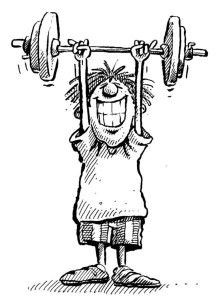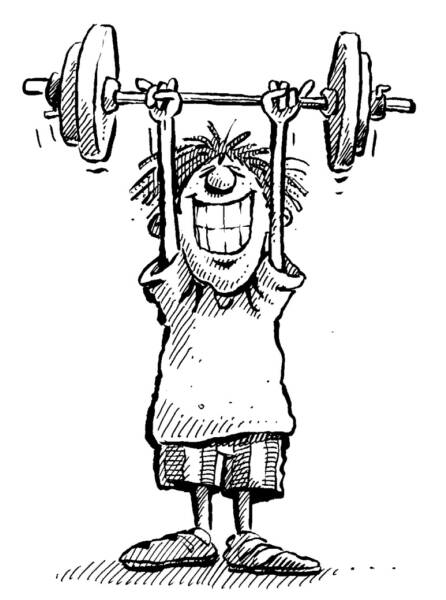A Musical Incentive to Hit the Gym
 Those of you who know me personally can attest that “exercise” is not a word that appears in my vocabulary. I can’t jog a block without stopping, I can’t throw a basketball to save my life, and if the grades I received in high school gym class had actually counted in my G.P.A., I definitely wouldn’t have graduated with any sort of academic honors. Therefore, you might find it curious that I am writing a blog post advocating physical exertion. Have I experienced a sudden change of heart? Have I channeled my inner athlete? Actually, the answer to both is no. I simply happened to come across a highly intriguing post by one of my favorite bloggers, Dr. Noa Kageyama of “The Bulletproof Musician.”
Those of you who know me personally can attest that “exercise” is not a word that appears in my vocabulary. I can’t jog a block without stopping, I can’t throw a basketball to save my life, and if the grades I received in high school gym class had actually counted in my G.P.A., I definitely wouldn’t have graduated with any sort of academic honors. Therefore, you might find it curious that I am writing a blog post advocating physical exertion. Have I experienced a sudden change of heart? Have I channeled my inner athlete? Actually, the answer to both is no. I simply happened to come across a highly intriguing post by one of my favorite bloggers, Dr. Noa Kageyama of “The Bulletproof Musician.”
For those unfamiliar with Dr. Kageyama’s blog, it is a really fantastic source of information and advice for overcoming performance anxiety and increasing productivity in the practice room, among other topics. In Kageyama’s most recent post, he presents a fascinating discussion about the extraordinary benefits that exercise can afford performers. While it’s fairly common knowledge that exercise can significantly reduce stress, including that caused by performing, what is less known is its potential to reduce “anxiety sensitivity”–essentially, getting nervous about being nervous. Kageyama explains that being moderately nervous before performing is normal, and actually a good thing, but when one reacts to anxious “symptoms” in a negative way, things start to spiral out of control. For example, if you’re about to go onstage and notice your bow hand is trembling a bit, a positive response would be “Oh well, I’ll just focus on my breathing and that’ll go away in a minute.” A not-so-positive response would be, “OH, MY GOSH, MY BOW ARM IS SHAKING LIKE A LEAF! Why did I decide to program the cello solo from ‘Quartet for the End of Time’ first on the program?!” By focusing on the anxious symptoms, you actually make them worse, which in turn causes more anxiety, and more, and then you don’t have “Quartet for the End of Time” so much as “Tremelo for the End of the Bow.”
Having experienced a few tremelos at the end of the bow in the past, I can totally relate to Kageyama’s discussion, and was really interested to learn that regular exercise, particularly aerobic exercise, can lessen the effects of anxiety sensitivity. I’m no psychologist, but I think it goes without saying that while some people might be more prone to sensitivity than others, many of us experience some degree of “nervousness about nervousness,” as silly as it might sound. I think it’s actually somewhat of a subconscious thing–we remember a bad performance due to nerves, and fear the same result. Obviously, much of this can and should be overcome on a purely psychological basis, but I think there’s certainly a lot to be said for being in decent physical shape. One example that comes to mind is that of my own father, who is also a professional cellist. He is the exact opposite of me fitness-wise; the man has not only run several marathons, but has done several ski marathons and even a canoe marathon as well. In fact, more than once he’s completed what he deems the “ultimate” marathon: performing an opera on the night before the Chicago marathon (his primary occupation is serving in the cello section of the Chicago Lyric), running the race the next morning, and arriving back at the opera house in time for a matinee performance. (I’ve double checked, but it seems, whatever appearance to the contrary, that we do in fact share DNA.) About twelve years ago, he gave his New York debut recital at Weill Hall. The morning of, instead of cloistering himself in the warm-up room, he ran three miles in Central Park, and said he wasn’t nervous at all going onstage (of course, he was quite well prepared, too, but I think the jogging definitely helped).
Kageyama also shares some examples of successful “musician-athletes” in his post, which provide some convincing anecdotal evidence for the benefits of exercise. To me, it is obvious that exercise should be a valuable component of any musician’s life, even though it’s not an activity I particularly enjoy on a personal level. What’s ironic, though, is that at the conservatory, I feel a lot of people are not exactly in the pink of health. We tend to spend so much time focusing on our musical well-being that it’s easy to forget about our physical well-being, and things like cafeteria food and late bedtimes don’t help either. Kageyama actually ends his post by posing an open question right along these lines: “Should exercise be an important part of a musician’s training?”
Well, Dr. K., I would have to say yes. I’m not advocating that conservatories require P.E. (which I always defined as “Physical Embarrassment”), but continuously searching for ways to educate aspiring musicians on the importance of maintaining good health, and how such a focus can relate to one’s activities in the practice room, would be a great starting point.
And students, if you’re like me and have pointy toothpicks for arms, I would encourage you to consider at least adding a small amount of exercise into your daily routine. The benefits will really be worth it, and you don’t have to worry about feeling guilty that you’re not practicing, because in a way, you are. Clearly, a win-win situation.

